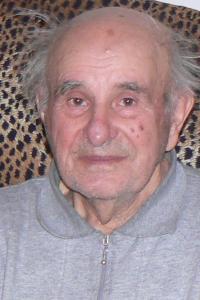I’ll take the manure as well. And those bushes, as they are

Stáhnout obrázek
František Kusmič was born in 1927 in Nový Přerov. His father‘s name was Matěj Kusmič, his mother‘s Kateřina, née Slunská. He also had an older sister Marie and a brother Matěj. As a seventeen-year-old adolescent, in December 1944, he was called into service to the German army. The military was stationed for training in the Wiener Neustadt, then moved to fight at the Czech-Slovak border. In April 1945, he was captured by the Red Army and as a prisoner of war, he was sent to Russia, where he spent the following year in captivity. In 1946, he returned to Czechoslovakia and settled in Kuřim, where he at first worked in a factory and then to at a farm. In the autumn 1946, he returned to his original home in Nový Přerov. He had to leave again in August 1948, when his family was deported to the formerly German settlement of Huzová. As he worked as a saddler in the Uničov sugar factory, he managed to move with his family to Uničov, where he still lives today.
